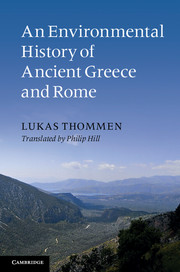Book contents
- Frontmatter
- Contents
- Figures
- Preface
- Introduction
- Part I Greece
- Chapter 1 The geographic space
- Chapter 2 People and nature
- Chapter 3 Agriculture
- Chapter 4 Forests and timber
- Chapter 5 Gardens
- Chapter 6 Animals
- Chapter 7 Food
- Chapter 8 Fire and water
- Chapter 9 Earthquakes and volcanoes
- Chapter 10 Mining
- Part II Rome
- Chronology
- Further reading
- Sources
- Bibliography
- Index
Chapter 7 - Food
Published online by Cambridge University Press: 05 June 2012
- Frontmatter
- Contents
- Figures
- Preface
- Introduction
- Part I Greece
- Chapter 1 The geographic space
- Chapter 2 People and nature
- Chapter 3 Agriculture
- Chapter 4 Forests and timber
- Chapter 5 Gardens
- Chapter 6 Animals
- Chapter 7 Food
- Chapter 8 Fire and water
- Chapter 9 Earthquakes and volcanoes
- Chapter 10 Mining
- Part II Rome
- Chronology
- Further reading
- Sources
- Bibliography
- Index
Summary
BASIC FOODS
Food and diet provide an obvious direct reference to the environment and nature in antiquity. Food had long been associated with human well-being, and this was reflected in the medical literature. The Corpus Hippocraticum, a collection of medical texts from the fifth to the third centuries bc, contains a document about diet which particularly describes a right lifestyle and also addresses the question of food and knowing what is beneficial for humans:
These things therefore the author must know, and further the power possessed severally by all the foods and drinks of our regimen, both the power each of them possessed by nature and the power given them by the constraint of human art … And it is necessary, as it appears, to discern the power of the various exercises, both natural exercises and artificial, to know which of them tends to increase flesh and which to lessen it; and not only this, but also to proportion exercise to bulk of food, to the constitution of the patient, to the age of the individual, to the season of the year, to the changes of the winds, to the situation of the region in which the patient resides, and to the constitution of the year … If indeed in addition to these things it were possible to discover for the constitution of each individual a due proportion of food to exercise, with no inaccuracy either of excess or of defect, an exact discovery of health for men would have been made. (Hippocr. vict. 1.2; Loeb)
With regard to food supply in ancient times, the ancient historian P. Garnsey distinguishes between ‘food crises’, which he considers to be endemic, and ‘famines’, which he sees as having appeared only occasionally. Moreover, he explains that in cases of food shortages and emergencies, chronic malnutrition or insufficient diet must be assumed. The assumption that the state of health of the population was generally good in Graeco-Roman times is thus called into question. Garnsey accordingly points to illnesses caused by an inadequate diet or vitamin deficiency, such as bladder stones, eye complaints and rickets. One should also note the ‘famine food’ mentioned by the Roman doctor Galen (ad 129–c. 216), which could replace or ‘stretch’ the food supply in bad times. Children and women were particularly affected by poor diet; overall, the urban population was disadvantaged compared with the rural population.
- Type
- Chapter
- Information
- An Environmental History of Ancient Greece and Rome , pp. 49 - 53Publisher: Cambridge University PressPrint publication year: 2012



